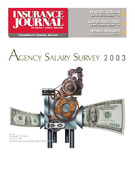Oct. 27 was supposed to be the “day of decision” for the French Government to sign (or not sign) an agreement, reached between the U.S. Attorney General’s (AG) Office in Los Angeles and representatives of Credit Lyonnais (CL) and other defendants, to settle criminal charges concerning the 1991 takeover of Executive Life Insurance Corp. (ELIC). It didn’t happen.
Grand jury indictments, sought by the U.S. Attorney General, charged CL, Altus Finance, Artemis S.A., the holding company of French billionaire businessman François Pinault (as well as Pinault himself), and others with evading U.S. and California laws that prohibited banks and foreign governments from controlling insurance companies. Over the weekend of Oct. 25-26, U.S. Attorney General John Ashcroft apparently instructed the Los Angeles office to delay any action until Nov. 24, to give the two sides additional time to reach an agreement on settling the case.
The reports first appeared in a news bulletin from Agence France Presse, and were repeated in many French newspapers, including the financial daily les Echos. Ashcroft met with Dominique Perben, the French Minister of Justice, on Oct. 21 to discuss the case as well as other matters. The news also coincided with a visit to the U.S. by Francis Mer, the French Minister of Finance, who is trying to mend fences between the two countries, and who met with U.S. Treasury Secretary John Snow, at a finance ministers’ conference of the 20 most industrialized countries in Mexico City.
CL had reached a preliminary agreement in September to settle the criminal case, which would have required the French bank Credit Agricole, who now owns CL, to put up $100 million with French insurer MAAF paying $35 million. The Consortium de Réalisation (CDR), a French government agency established to take over CL’s debt mountain in 1995, had reportedly agreed to pay an additional $100 million in fines and to set up a $350 million fund to compensate ELIC policyholders.
However the French government announced Oct. 15 that it would reject the accord, because it did not include a settlement of all charges against French companies and citizens. The refusal supposedly followed a request for extradition, which the French government denied.
That left the AG’s office with little choice but to go forward with the case, as urged by many people involved with it in California, including Congress-man Doug Ose, who has been pressing for the indictments for more than a year.
The extradition question caused controversy, as France has no treaty with the U.S. covering the types of crime with which Pinault, Jean-Yves Haberer, CL’s CEO at the time of the ELIC sale, recently departed CEO Jean Peyrelevade, and a number of others have reportedly been charged. In addition, the actual grand jury indictments have yet to be “unsealed.”
The French government may have had other reasons to reject the deal. Pinault is a very powerful man, and a close personal friend of French President Jacques Chirac. In addition, using government funds to pay nearly half a billion dollars to settle a case that most French people think is politically motivated was not greeted with enthusiasm in France. The AFP quoted Chirac as stating, “In the name of the financial interests of the State, the government will continue to actively seek an agreement, which, this time, will be a definitive one with American authorities.”
Given the extremely high level of the people involved on both sides of the Atlantic, Los Angeles prosecutors were forced to take the ultimatum off the table and restart negotiations.
What a new agreement might contain, and what is actually meant by “global accord” remains obscure. The term is the same in French and equally imprecise. It could mean that the AG’s office would agree to drop all the criminal charges against all of the corporations and individuals named in the unsealed indictment in exchange for the promised amount. It could also mean that negotiations should be opened with civil claimants as well, notably the lawsuit being pursued against CL and the other defendants by California Attorney General Bill Lockyer and the lawsuit filed by the California Department of Insurance, under former Commissioner Chuck Quackenbush.
While Lockyer’s suit has been transferred to the federal courts, and is currently stayed, the CDI’s civil action has been going through the discovery phase of litigation in Los Angeles. A motion has been filed by the plaintiff’s attorneys to set a trial date, indicating that they are ready to proceed.
The amounts in question, according to court filings and several reports, are not negligible. At least 42,500 ELIC policyholders are allegedly receiving less from Aurora Life, its successor (which is controlled by Pinault’s Artemis), than they should be getting. This includes over 1,600 structured settlement agreements ELIC underwrote, many of which are for millions of dollars. With all the politics involved a settlement of the criminal case appears likely, but including the civil claimants appears less so. However, if a fair agreement can be reached, it would certainly benefit not only CL, but also ELIC’s former policyholders, who’ve now been waiting for 12 years to receive compensation.
The last hurdle, which would have to be overcome if a truly “global” settlement is to be reached, concerns the junk bond portfolio. While the numbers may be in dispute, it’s fairly clear that CL did in fact contravene the now repealed Glass-Steagall Act, which prohibited banks from owning insurers. As it was majority owned by the French government at the time, it in all likelihood also violated the California statutes prohibiting any foreign government from owning more than 25 percent of a domestic insurer.
These are serious charges, and could result in CL losing its banking license. It might also lose any profits it made when the bonds were resold to Artemis.
Topics USA California France
Was this article valuable?
Here are more articles you may enjoy.


 AIG, Chubb Can’t Use ‘Bump-Up’ Provision in D&O Policy to Avoid Coverage
AIG, Chubb Can’t Use ‘Bump-Up’ Provision in D&O Policy to Avoid Coverage  MAPFRE Denied Injunction Against AAA Auto Insurance Sales in Massachusetts
MAPFRE Denied Injunction Against AAA Auto Insurance Sales in Massachusetts  Married Insurance Brokers Indicted for Allegedly Running $750K Fraud Scheme
Married Insurance Brokers Indicted for Allegedly Running $750K Fraud Scheme  After Falling 6% in 2025, Average Auto Insurance Cost Will Stabilize in 2026, Says Insurify
After Falling 6% in 2025, Average Auto Insurance Cost Will Stabilize in 2026, Says Insurify 


